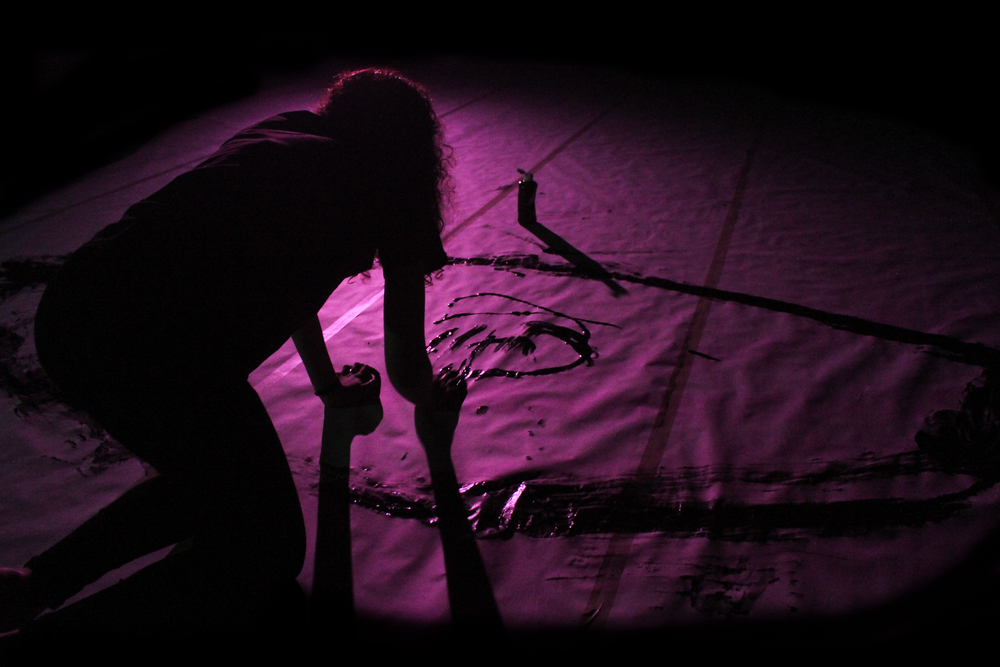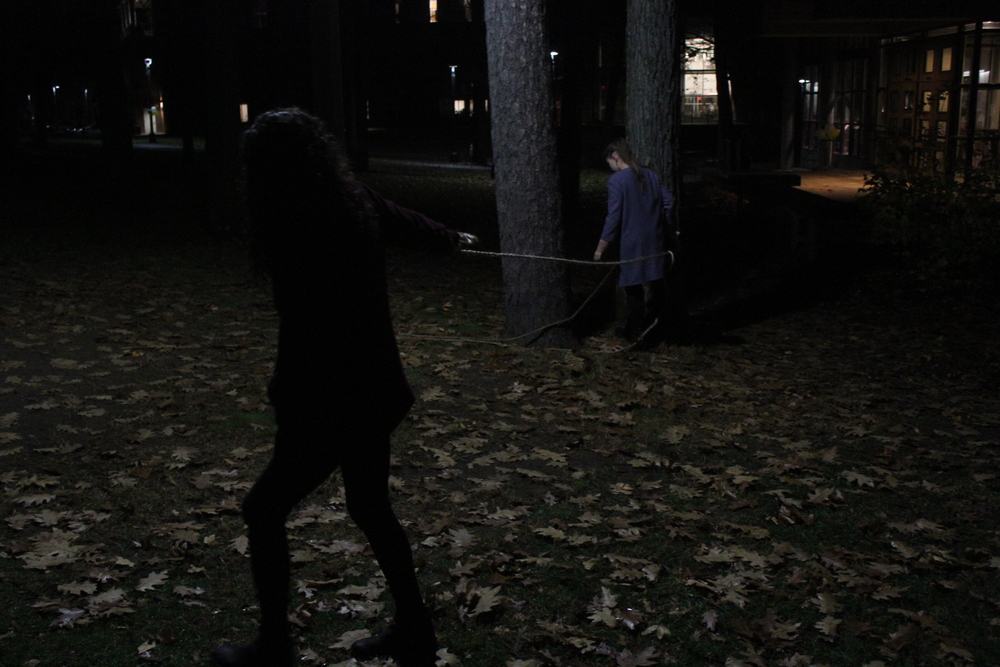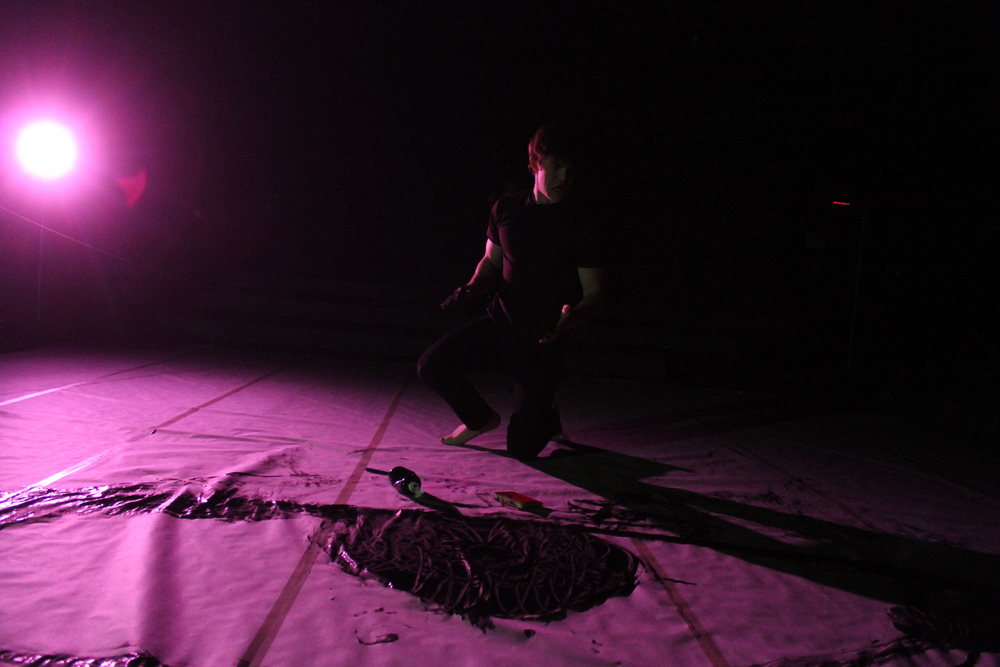
Lena Schwartz ’19. Photo Credit: Paris Baillie ’17
Trompe L’Oeil, the newest of experimental director Aaron Ardisson ‘16’s forays into the worlds and minds of genius artists, leaves much to the viewer’s interpretation. Like Ardisson’s previous devised piece, Dacha, which created its own world out of three Anton Chekhov plays, Trompe L’Oeil throws convention out the window in exchange for experimentation, while attempting to delve into the psyche of another genius artist: Edgar Allan Poe.
We are told (if not in direct words) to expect the unexpected from the very start, when we are led outside of the theater to witness three distinct scenes happening simultaneously—Alex O’Shea ’19, dressed in black boots and red lipstick, paces laps in front of the theater with restrained urgency. Allyson Schult ’17 dances in circles with her head covered by a black bag; a single hand is covered in blood. Izabella Rinskaya ’19 leads Lena Schwartz ’19 around with a rope, searching for something unknown. Mariam Vahradyan ’18 sits on a bench with a cigarette in hand. Like Schult, her head is completely covered by a black bag. It is left for us to decide whether this display is the representation of a mind or our only glimpse of reality.

Lena Schwartz ’19 and Izabella Rinskaya ’19. Photo Credit: Paris Baillie ’17
When we are led into the dark theater, though, it is quickly and shockingly clear that we have entered Poe’s mind. Will Clark ’16, although not credited under any exact role (there were no roles listed in the show’s program), is one of multiple representations Trompe L’Oeil presents of Poe himself. The mind we have entered is one in its final days, which, as the program notes, involved a descent into delirium tremens, “a psychotic condition typical of withdrawal in chronic alcoholics involving tremors, hallucinations, anxiety, and disorientation.” A bottle of liquor and a red notebook lay beside Clark as he sits in a black wooden chair. The floor is covered in paper and, just out of his reach, there is a single bottle of black paint—the possibility for creation, now unattainable. All of this is revealed visually; until Trompe’s finale, in which the entire cast recites different passages from Poe’s short stories in tandem, not a single word is spoken.

Will Clark ’16. Photo Credit: Paris Baillie ’17
Being deprived of words at first seems sacrilegious in a piece about one of the great writers of the 19th century. However, it seems that all moments leading up to the finale are suspended in some disturbed, Poe-ian form of writer’s block. What we get are a series of short vignettes, the very first one involving Schwartz opening the bottle of paint on stage and painting an eye onto the floor with her bare hands. A “mind’s eye” becomes the frame behind which we sit for all that follows. Another vignette sees O’Shea, herself a “Poe,” attempting to write in a journal with her hand being constantly jerked by a rope-pulley system operated by Schult. When, after the vignettes are finished, Poe’s words are finally spoken, the writer’s block is released. It is a triumphant moment—a crescendo in prose.
Trompe L’Oeil is the most well-controlled, fully-realized, and clear representation of Ardisson’s creative vision that we have yet seen. It becomes a portrait of Poe’s, Ardisson’s, and the entire cast’s creative minds simultaneously. Trompe L’Oeil may show a haunted artist in his final, desperate days, but it is clear after seeing it that Ardisson’s own career as an artist is early in its prime.
Gabe Cohn is a senior English major and Editor-In-Chief of the Living Newsletter. He has also recently contributed to Saratoga Living and Skidmore Unofficial.
Reflections from the cast
“I feel like a more open minded person creatively after being involved with this show.” –O’Shea
“It was intense. A lot more intense than I thought it was going to be. When you take away words, sometimes you lose the intensity and emotions behind the piece, but rather than have that happen, it instead allowed us to explore more through our body language than we would have otherwise.” –Schult
“When you have a text, you’re trying to get to the end goal. You already have the vision. You see the text, you know what the set is going to be, and you’re trying to get to the end result. With devised work, you think: ‘we’re going to make something, and the stage that it’s at when opening night happens is where it’s supposed to be.’ It was really empowering.” –Clark
“A lot of colleges don’t have work like this. It makes me feel lucky to be here.” –Schwartz
Production Credits
Director: Aaron Ardisson ’16
Stage Manager: Sam Grant ’18
Cast: Will Clark ’16, Mariam Vahradyan ’18, Allyson Schult ’17, Alex O’Shea ’19, Izabella Rinskaya ’19, Lena Schwartz ’19.











